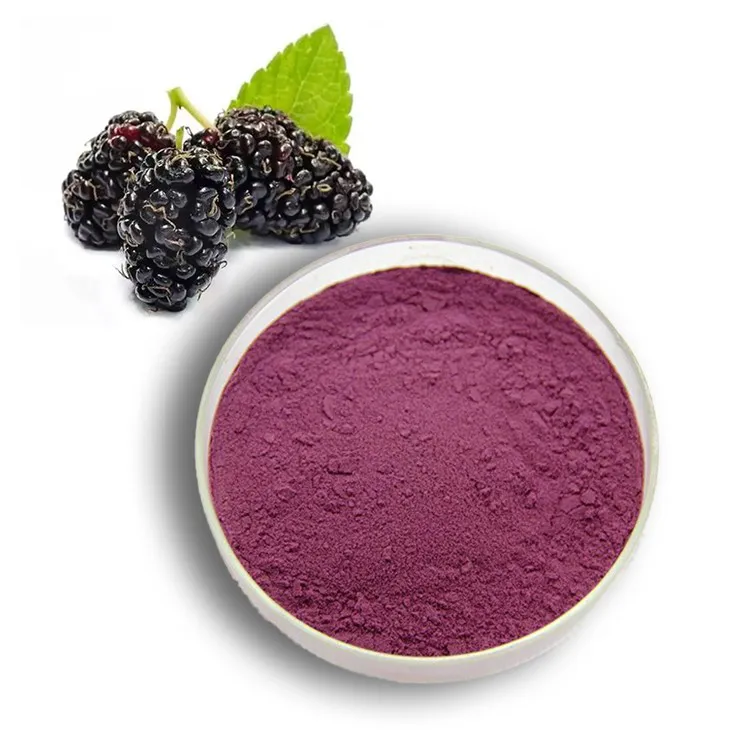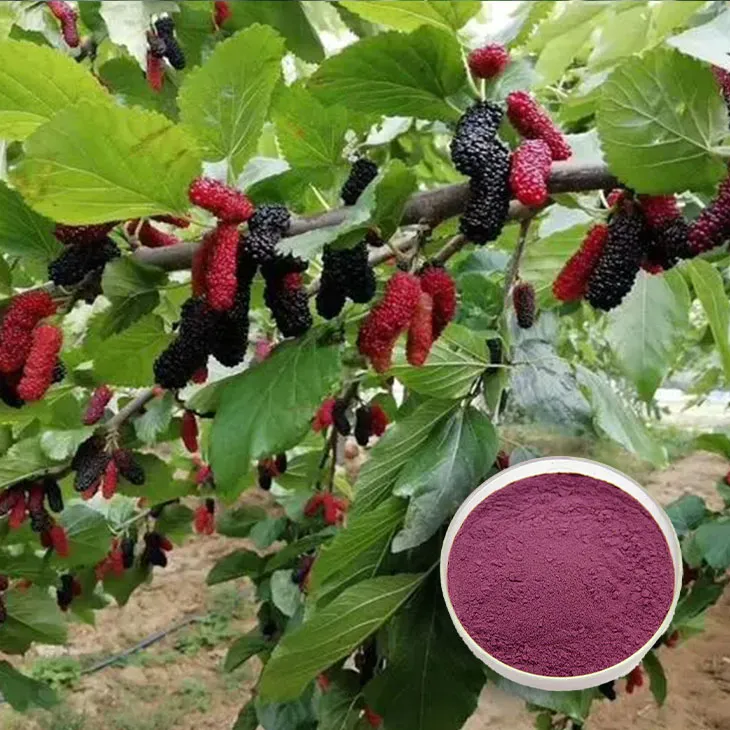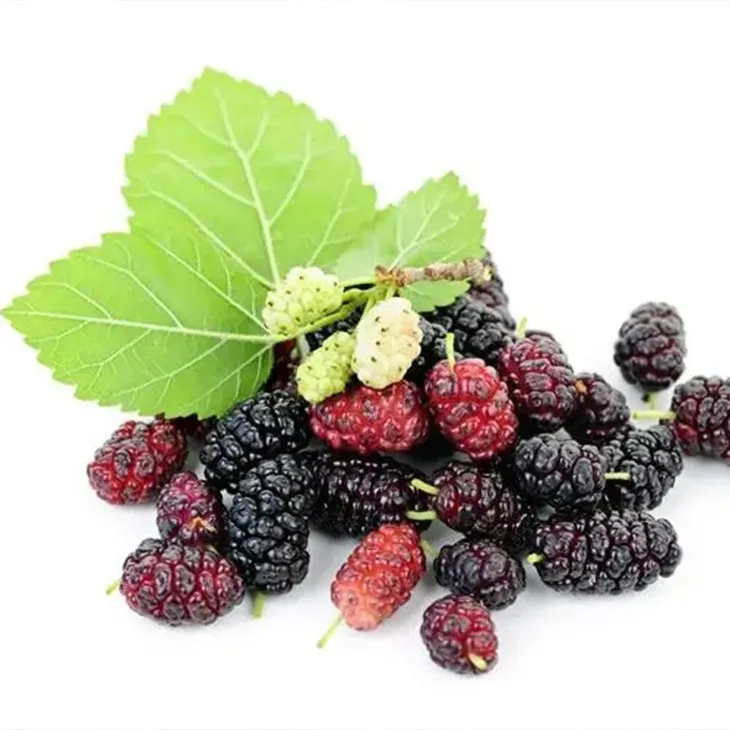- 0086-571-85302990
- sales@greenskybio.com
Inflammation Interrupted: The Anti-Inflammatory Impact of Mulberry Extract Resveratrol
2024-07-28

1. Introduction
Inflammation is a complex biological response of the body to harmful stimuli, such as pathogens, damaged cells, or irritants. While acute inflammation is a normal and necessary part of the body's defense mechanism, chronic inflammation has been associated with numerous diseases, including cardiovascular diseases, diabetes, arthritis, and certain cancers. In recent years, natural compounds with anti - inflammatory properties have attracted significant attention in the field of medicine and health. Among these, Mulberry Extract resveratrol has emerged as a particularly promising candidate.

2. The Chemistry of Mulberry Extract Resveratrol
Resveratrol is a natural polyphenol that can be found in various plants, including mulberries. It has a unique chemical structure, which is believed to be responsible for its biological activities. Resveratrol is a stilbene derivative, consisting of two phenyl rings connected by a carbon - carbon double bond. This structure gives it antioxidant properties, as it can scavenge free radicals and prevent oxidative damage to cells. In addition, the chemical structure of resveratrol also allows it to interact with various cellular targets, including proteins and enzymes involved in the inflammatory response.

3. Interaction with Immune Cells
3.1 Macrophages
Macrophages play a crucial role in the inflammatory process. They are the first line of defense against pathogens and are also involved in the clearance of damaged cells. Mulberry Extract resveratrol can modulate the function of macrophages in several ways. For example, it can inhibit the production of pro - inflammatory cytokines, such as tumor necrosis factor - alpha (TNF - α) and interleukin - 1 beta (IL - 1β), by macrophages. This is achieved through the regulation of signaling pathways involved in cytokine production, such as the nuclear factor - kappa B (NF - κB) pathway.
3.2 T - lymphocytes
T - lymphocytes are another important component of the immune system. They are involved in cell - mediated immunity and can also contribute to inflammation. Resveratrol has been shown to affect the function of T - lymphocytes. It can suppress the activation and proliferation of T - lymphocytes, particularly those involved in the pro - inflammatory Th17 subset. This can help to reduce the overall inflammatory response in the body.

4. Modulation of Inflammatory Mediators
4.1 Cytokines
As mentioned earlier, resveratrol can inhibit the production of pro - inflammatory cytokines. In addition to TNF - α and IL - 1β, it can also affect other cytokines, such as interleukin - 6 (IL - 6) and interferon - gamma (IFN - γ). By reducing the levels of these cytokines, resveratrol can dampen the inflammatory cascade.
4.2 Chemokines
Chemokines are small proteins that play a key role in recruiting immune cells to the site of inflammation. Resveratrol can interfere with the production and function of chemokines. For example, it can inhibit the production of monocyte chemoattractant protein - 1 (MCP - 1), which is involved in the recruitment of monocytes to inflamed tissues. This can limit the infiltration of immune cells and thereby reduce inflammation.
4.3 Eicosanoids
Eicosanoids are lipid - based inflammatory mediators. Resveratrol can modulate the production of eicosanoids, such as prostaglandins and leukotrienes. It can inhibit the enzymes involved in the synthesis of these eicosanoids, such as cyclooxygenase (COX) and lipoxygenase (LOX). By doing so, resveratrol can reduce the production of inflammatory eicosanoids and alleviate inflammation.
5. Anti - Inflammatory Mechanisms at the Cellular Level
5.1 Mitochondrial Function
Mitochondria are the powerhouses of the cell and also play a role in inflammation. Resveratrol has been shown to improve mitochondrial function, which can have anti - inflammatory effects. For example, it can enhance mitochondrial biogenesis, increase mitochondrial membrane potential, and reduce mitochondrial reactive oxygen species (ROS) production. By improving mitochondrial function, resveratrol can prevent the activation of inflammatory pathways that are triggered by mitochondrial dysfunction.
5.2 Endoplasmic Reticulum Stress
Endoplasmic reticulum (ER) stress is associated with inflammation. Resveratrol can relieve ER stress by modulating the unfolded protein response (UPR). By reducing ER stress, resveratrol can inhibit the activation of inflammatory pathways that are linked to ER stress, such as the inositol - requiring enzyme 1 (IRE1) and protein kinase RNA - like endoplasmic reticulum kinase (PERK) pathways.
6. Potential Applications in Medicine and Health
6.1 Cardiovascular Diseases
Chronic inflammation is a major contributor to the development of cardiovascular diseases. Resveratrol's anti - inflammatory properties make it a potential therapeutic agent for these diseases. It can reduce inflammation in the blood vessels, inhibit the formation of atherosclerotic plaques, and improve endothelial function. For example, in pre - clinical studies, resveratrol has been shown to reduce the levels of inflammatory markers in the blood, such as C - reactive protein (CRP), and improve the function of the heart in animal models of heart failure.
6.2 Diabetes
Inflammation also plays a role in the pathogenesis of diabetes. Resveratrol can reduce inflammation in pancreatic islets, protect beta - cells from damage, and improve insulin sensitivity. In diabetic animal models, resveratrol treatment has been shown to reduce blood glucose levels and improve glycemic control. It can also reduce the levels of pro - inflammatory cytokines in the pancreas and adipose tissue, which are associated with insulin resistance.
6.3 Arthritis
Arthritis is a chronic inflammatory disease that affects the joints. Resveratrol can reduce inflammation in the joints, relieve pain, and improve joint function. It can inhibit the production of pro - inflammatory cytokines and chemokines in the synovial fluid, reduce the infiltration of immune cells into the joints, and inhibit the degradation of cartilage. In pre - clinical studies, resveratrol has shown promising results in reducing joint inflammation and improving the symptoms of arthritis in animal models.
6.4 Cancer
Although the relationship between inflammation and cancer is complex, chronic inflammation can promote cancer development and progression. Resveratrol's anti - inflammatory properties may contribute to its potential anti - cancer effects. It can reduce inflammation in the tumor microenvironment, inhibit the growth and metastasis of cancer cells, and enhance the anti - cancer immune response. For example, in some cancer cell lines, resveratrol has been shown to inhibit the production of pro - inflammatory cytokines that support cancer cell survival and proliferation.
7. Conclusion
In summary, Mulberry extract resveratrol has significant anti - inflammatory effects through its interaction with immune cells, modulation of inflammatory mediators, and anti - inflammatory mechanisms at the cellular level. These anti - inflammatory properties make it a promising compound for potential applications in the field of medicine and health, particularly in the treatment of chronic inflammatory diseases such as cardiovascular diseases, diabetes, arthritis, and cancer. However, further research is still needed to fully understand its mechanisms of action, optimize its dosage and formulation, and evaluate its safety and efficacy in human clinical trials.
FAQ:
What is mulberry extract resveratrol?
Mulberry extract resveratrol is a compound that is obtained from mulberries. It has been found to possess various beneficial properties, and in particular, it has shown significant anti - inflammatory effects.
How does mulberry extract resveratrol interact with immune cells to reduce inflammation?
It can influence immune cells in multiple ways. For example, it may regulate the activation and function of macrophages. Macrophages play a crucial role in the inflammatory response. Resveratrol can potentially prevent macrophages from over - activating and releasing excessive inflammatory factors, thus interrupting the inflammatory process.
What are the inflammatory mediators that mulberry extract resveratrol can modulate?
It can modulate mediators such as cytokines. Cytokines are small proteins that are involved in cell - to - cell communication in the immune system. Resveratrol can either up - regulate anti - inflammatory cytokines or down - regulate pro - inflammatory cytokines, thereby rebalancing the cytokine profile and reducing inflammation.
What are the potential medical applications of mulberry extract resveratrol?
Potential medical applications include the treatment of inflammatory diseases such as arthritis. Since it can interrupt the inflammatory process, it may help in reducing joint inflammation and pain. It may also be explored for its potential use in other conditions with an inflammatory component, like certain skin diseases or even some aspects of cardiovascular diseases.
How can health - conscious individuals benefit from mulberry extract resveratrol?
Health - conscious individuals may benefit as it can potentially help in maintaining a healthy inflammatory state in the body. It may be included in a diet as a supplement (if available in supplement form) to support overall health. By reducing chronic low - level inflammation, it may contribute to better long - term health outcomes, such as reduced risk of developing certain age - related diseases.
Related literature
- Anti - Inflammatory Properties of Resveratrol: A Review of the Evidence"
- "Mulberry Extract and Its Bioactive Compounds: Implications for Health"
- "Resveratrol in Inflammatory Disorders: Mechanisms and Therapeutic Potential"
- ▶ Hesperidin
- ▶ Citrus Bioflavonoids
- ▶ Plant Extract
- ▶ lycopene
- ▶ Diosmin
- ▶ Grape seed extract
- ▶ Sea buckthorn Juice Powder
- ▶ Fruit Juice Powder
- ▶ Hops Extract
- ▶ Artichoke Extract
- ▶ Mushroom extract
- ▶ Astaxanthin
- ▶ Green Tea Extract
- ▶ Curcumin
- ▶ Horse Chestnut Extract
- ▶ Other Product
- ▶ Boswellia Serrata Extract
- ▶ Resveratrol
- ▶ Marigold Extract
- ▶ Grape Leaf Extract
- ▶ New Product
- ▶ Aminolevulinic acid
- ▶ Cranberry Extract
- ▶ Red Yeast Rice
- ▶ Red Wine Extract
-
Almond Extract Powder
2024-07-28
-
Baicalin
2024-07-28
-
Peppermint Oil
2024-07-28
-
Cat Claw Extract
2024-07-28
-
Bamboo Leaf extract
2024-07-28
-
Green Tea Extract
2024-07-28
-
Curcumin Extract
2024-07-28
-
Red Vine Extract
2024-07-28
-
Kidney Bean Extract
2024-07-28
-
Mangosteen extract powder
2024-07-28





















